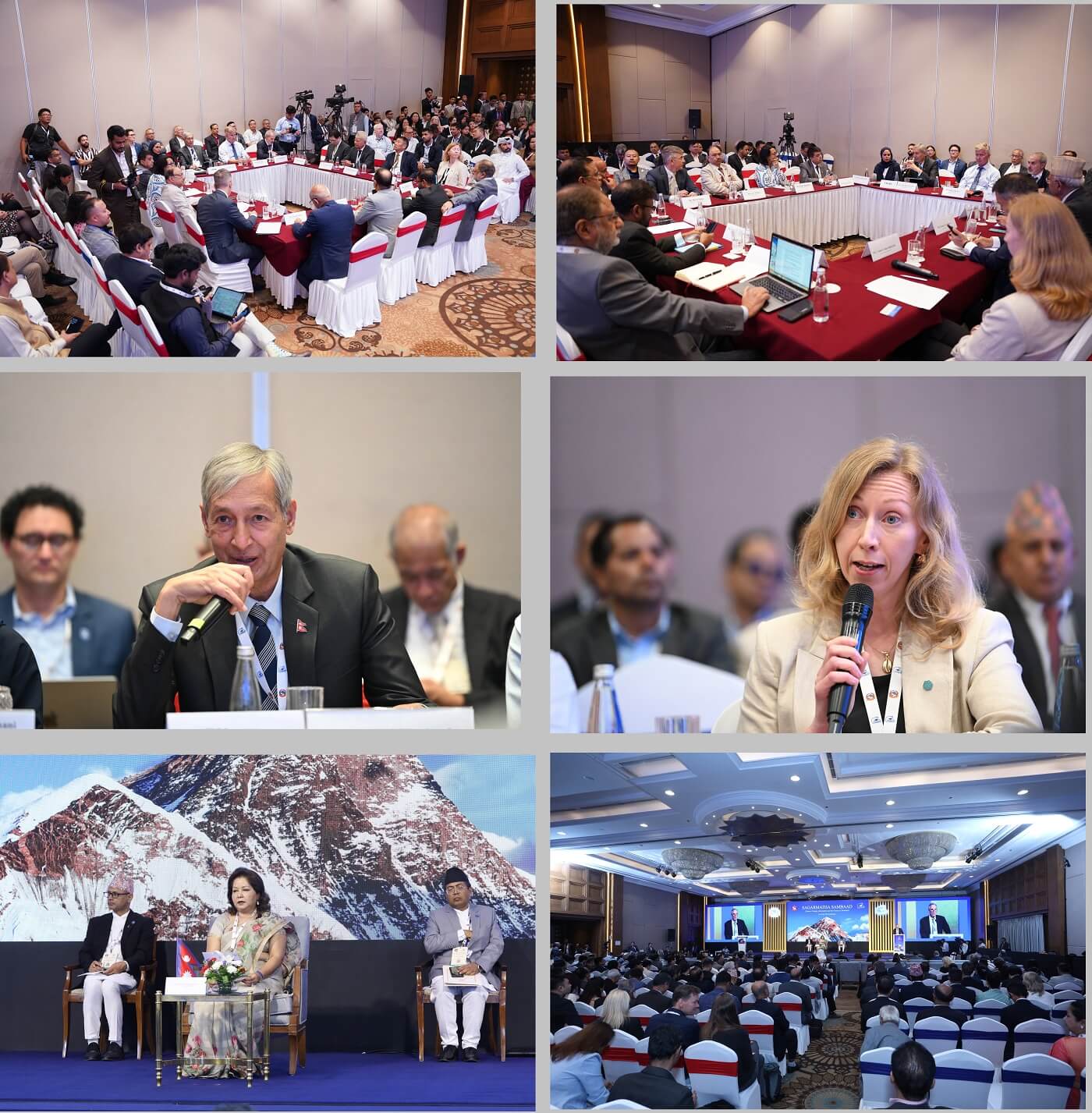
Sagarmatha Sambaad 2025 Concludes with 25-Point Climate Call.
The Sagarmatha Sambaad 2025 concluded in Kathmandu on 18 May 2025, Sunday, with the release of a 25-point Call to Action, addressing the shared challenges of climate change from the Himalayas to island nations.
The Government of Nepal organized this international dialogue, which resulted in a formal document titled "Sagarmatha Call for Action."
Addressing Climate Impacts Across Diverse Terrains
The Call to Action highlights the widespread effects of climate change from mountainous regions to the plains and outlines measures to reduce climate-related risks.
The conference's theme was “Climate Change, the Himalayas, and the Future of Humanity. " It featured over a dozen sessions involving ministerial-level representatives from 12 countries, over 150 foreign delegates, and 61 development partners and organizations.
Discussions focused on shared concerns such as:
-
Building partnerships between mountainous and island nations
-
Prioritizing green economies
-
Preventing and responding to climate-related loss and damage
-
Promoting climate justice
-
Strengthening regional and global cooperation
Nepal’s Call to the Global Community
Through the Sagarmatha Sambaad, Nepal drew international attention to the effects of climate change from the mountains to the lowlands.
The Call to Action focuses on promoting shared frameworks and actions to uplift vulnerable communities while committing to building a fair, inclusive, and sustainable future.
“We see the need to strengthen regional and global partnerships to improve access to climate-friendly technologies and build capacity,” the document states.
It also highlights the need to:
-
Mobilize targeted finance for sustainable development in mountain areas
-
Establish a dedicated fund for mountain countries
-
Ensure climate finance access through bilateral, multilateral, and alternative sources
-
Promote the use of grants and concessional funding mechanisms
Nepal’s Global Commitment to Climate Goals
The document reaffirms Nepal’s commitment to limiting the global temperature increase to 1.5°C above pre-industrial levels.
It calls on all countries to set emission reduction goals while ensuring evidence-based, inclusive solutions for developing nations.
The Call to Action promotes inclusive climate strategies involving children, youth, women, persons with disabilities, and the elderly.
It also recommends:
-
Establishing an international platform focused on mountains and climate change
-
Utilizing science, technology, and innovation for climate solutions
Nepal’s Message to the World
Foreign Minister Dr. Arzu Rana Deuba officially released the Call to Action, stating that the Sagarmatha Sambaad has delivered a strong global message to protect the Himalayas.
“This forum has presented the growing threats of climate change in the Himalayas to the world,” she said during the closing session.
She added that participants agreed on the urgency of addressing these threats to safeguard the future of humanity.
Voices from Small Island Nations
Ian Fry, an international expert in environmental law and human rights policy representing Tuvalu, praised Nepal’s climate message for its clarity.
He expressed full support for the Call to Action and emphasized shared concerns:
“As a small island nation representative, I clearly see the connection between melting glaciers and rising sea levels. What happens in the mountains affects us too.”
Fry highlighted the importance of building cooperation across mountain and island nations to raise a unified voice in climate discussions.
“To advocate effectively, we need a joint platform—from the peaks to the shores—to push for action in global climate forums.”
Extending Nepal’s Message to Global Platforms
Foreign Secretary Amrit Bahadur Rai announced that the Call to Action will be taken to global and regional forums, including:
-
The Glaciers Preservation Conference in Tajikistan
-
The United Nations
-
COP30
-
Regional partnership forums
-
International civil society networks
“Nepal’s climate diplomacy will not stop here,” Rai said, confirming plans to advance policies and action plans for implementation.
Youth and Expert Perspectives
Anju Pokharel, Program Coordinator at Youth Alliance for Environment, stressed that climate change disproportionately affects children, youth, marginalized communities, and people with different abilities.
“This dialogue addresses those concerns. It’s important—but not enough alone,” she said.
Sanot Adhikari, climate and environmental expert, said the Sagarmatha Call to Action was shaped by discussions on the challenges faced by the Hindu Kush Himalaya and other mountain regions.
“Nepal’s key climate agendas are included in this document,” he said. “And all participating nations contributed to building a shared understanding.”
A Long-Term Platform for Mountain Climate Dialogue
Nepal plans to develop the Sagarmatha Sambaad as a recurring international forum every two years.
The government had proposed the idea nearly six years ago to bring global attention to climate impacts in the Himalayan region.
However, earlier editions were delayed due to the COVID-19 pandemic and domestic political changes.


